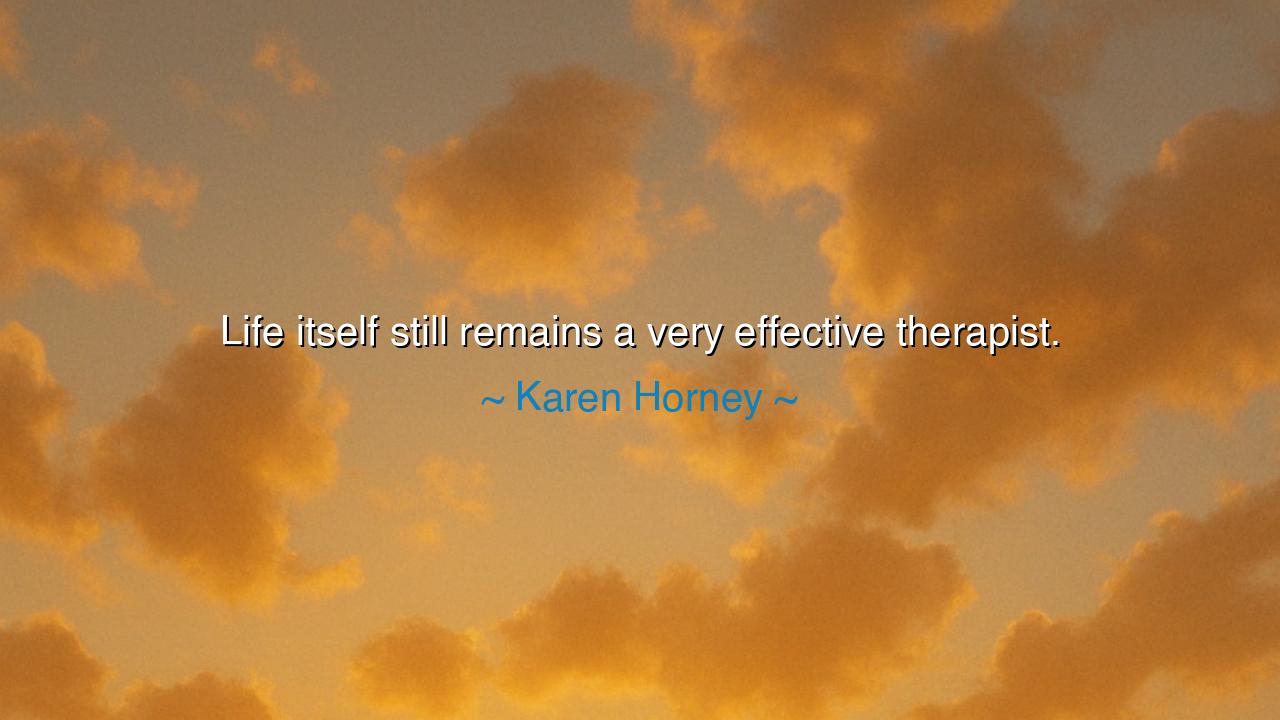
Life itself still remains a very effective therapist.






“Life itself still remains a very effective therapist.” – Karen Horney
In this serene yet powerful statement, Karen Horney, one of the great pioneers of psychoanalysis and human psychology, speaks of life not as an adversary, but as a teacher—a living therapist that heals, instructs, and transforms us through experience. When she says, “Life itself still remains a very effective therapist,” she is reminding us that no matter how much we seek counsel or theory, the greatest wisdom often comes not from books or experts, but from living itself—from the pain we endure, the love we give, and the lessons we learn through time. Life, she suggests, has a mysterious way of revealing our hidden wounds, testing our strength, and showing us the path to healing—if we have the courage to listen.
The origin of this insight lies in Horney’s own journey as both healer and seeker. A German-born psychoanalyst who broke from the rigid theories of Freud, she brought warmth and humanity into the world of psychology. While Freud saw the human soul as driven by conflict and instinct, Horney believed in growth, in the power of experience and self-awareness. She had lived through two world wars, personal loss, and exile, and she learned that the human spirit does not merely survive hardship—it evolves through it. Her words reflect this faith: that the struggles we face are not only wounds, but opportunities for awakening; that life itself is a constant session of therapy, shaping our hearts and sharpening our wisdom.
To say that life is a therapist is to recognize that every joy and sorrow, every success and failure, is a mirror. The laughter of friendship teaches us connection; heartbreak teaches us empathy. Failure humbles pride; loss deepens love. We enter the world unknowing, but each day teaches us something new about courage, humility, and endurance. Where we expect punishment, life gives instruction. Where we see chaos, life offers meaning—if we are willing to reflect. For therapy, as Horney understood, is not only the mending of pain, but the discovery of truth within it.
Consider the life of Nelson Mandela, who spent twenty-seven years in prison for his beliefs. Cut off from freedom, he could have grown bitter or broken. Instead, he let the years teach him. He learned patience, restraint, forgiveness—the wisdom that can only come through endurance. When he emerged, he was no longer merely a political leader, but a healer of nations. His suffering became his schooling; life itself had been his therapist. In him, we see that wisdom does not descend from comfort, but rises from struggle.
Horney’s insight also carries a gentle rebuke to modern humanity, for we are quick to flee from pain, to seek distractions, or to demand quick cures for suffering. Yet she reminds us that growth takes time, and that even our wounds have their seasons. The storms that shake us today may one day reveal the roots of our strength. Just as nature heals through slow transformation—the seed becoming a tree, the wound becoming a scar—so too does the soul heal through the patient unfolding of experience. Life, when lived with awareness, is its own medicine.
But life’s lessons do not come automatically—they require reflection. The same fire that purifies can also destroy, depending on how we meet it. Horney teaches that healing begins when we stop resisting our experiences and begin listening to them. To ask, “What is this pain teaching me?” is to begin the therapeutic work that life itself intends. The person who flees from discomfort learns little; the one who faces it with courage learns everything. In this way, we become not the victims of life, but its students.
So, my child of experience, take this wisdom to heart: when you are lost, when sorrow visits you, when failure humbles you, remember that life itself is teaching you something no book can convey. Be patient with your journey. Let hardship deepen your understanding and joy expand your compassion. Do not rush to escape your lessons, for they are sacred in their timing. For as Karen Horney reminds us, life’s therapy never ends—but through its continual unfolding, we come ever closer to the fullness of who we are meant to be.






AAdministratorAdministrator
Welcome, honored guests. Please leave a comment, we will respond soon